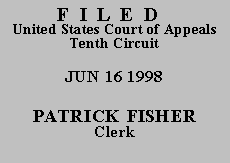

| UNITED STATES OF AMERICA, |
|
Mr. Bullington argues that there was insufficient evidence to support the district court's finding that he was an organizer, leader, manager, or supervisor under USSG § 3B1.1(c). We review the district court's factual findings for clear error, see United States v. Albers, 93 F.3d 1469, 1486-87 (10th Cir. 1996), and find none here. The record contains ample evidence that Mr. Bullington exercised control over the other three co-conspirators. Mr. Bullington initially suggested robbing banks as a way to make money, see IV R. at 37, was primarily responsible for the manner in which the robberies were executed, particularly the Worland robbery, see IV R. at 12, 38-39, and was considered the "shot caller" by Aaron Hopkins, the other co-conspirator most intimately associated with the planning and execution of the robberies. See IV R. at 53-54.
As to Mr. Bullington's argument that the district court failed to make sufficiently specific findings, the record indicates the district court considered the applicable factors under USSG § 3B1.1(c), specifically found that Mr. Bullington was a "co-leader" of the conspiracy and determined that the two level enhancement was appropriate. See IV R at 63-65. Mr. Bullington's reliance on United States v. Roberts, 14 F.3d 502, 522 (10th Cir. 1993), is thus misplaced, as the district court made specific findings relating to Mr. Bullington's role as an organizer or leader. See id. at 522-23 (stating that district court provided only a "character sketch" which did not "fulfil the specific criteria mandated by
§ 3B1.1(a)"). It follows that the district court's findings, supported by the record, were sufficient to support the § 3B1.1(c) enhancement.
AFFIRMED.
Entered for the Court
Paul J. Kelly, Jr.
Circuit Judge
*. This order and judgment is not binding precedent, except under the doctrines of law of the case, res judicata, and collateral estoppel. This court generally disfavors the citation of orders and judgments; nevertheless, an order and judgment may be cited under the terms and conditions of 10th Cir. R. 36.3.
**. After examining the briefs and the appellate record, this three-judge panel has determined unanimously that oral argument would not be of material assistance in the determination of this appeal. See Fed. R. App. P. 34(a); 10th Cir. R. 34.1.9. The cause is therefore ordered submitted without oral argument.